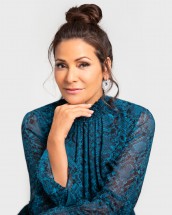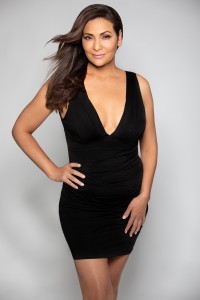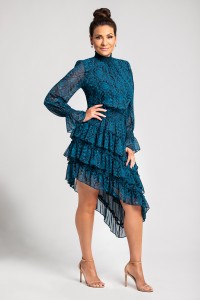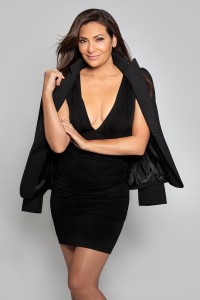WITH LOVE, created by Gloria Calderón Kellett, is an Amazon Prime Video original series, now streaming. The show centers on the Diaz family of Portland, Oregon, and their adventures around significant holidays over the course of a year.
Constance Marie plays Beatriz Diaz, in a seemingly stable marriage to her husband/restaurant partner Jorge (Benito Martinez), mother of two grown children, Lily (Emeraude Toubia) and Jorge Jr. (Mark Indelicato), and daughter of opinionated parents Marta (Renee Victor) and Luis (Pepe Serna). Despite her outward calm, Beatriz may be ready to make some big changes.
In Part 2 of our exclusive interview, Marie talks more about WITH LOVE, as well the progress and lack thereof for Latinx people in the industry, and playing a rotoscoped character in the series UNDONE, also available on Prime Video and, for free, on IMDb TV.
ASSIGNMENT X: When you’re working on a character, do you have a particular process beforehand, or do you show up and see how she feels as you’re doing her?
CONSTANCE MARIE: I go into every role straight, clean, without any preconceived notions. When I read it, that’s when all the connections and ideas pop up, and that’s my initial take on the character. And then, as I work on it more and more, I’ll find the center of the character, and the core relationships with each of the other characters, and I’ll do a history and background of the connectedness of each of those relationships. And she has a certain kind of music that she would listen to, and it’s interesting. It’s the costume, everything. It depends. Sometimes it’s the outside in, and sometimes it’s the inside out, depending on how I approach a character.
AX: Which is it for Beatriz?
MARIE: Beatriz is from the inside out.
AX: What is at Beatriz’s core?
MARIE: She’s trying to be the best daughter and best mother that she knows how, and in that, she forgets who she is. She’s very lonely. Or at least she starts lonely, that’s what I’ll say. I don’t want to tip anything. But she starts from a very lonely place.
AX: Have you had to learn how to do anything in order to play her, in terms of either the restaurant, or anything else?
MARIE: What’s interesting is, I’ve never worked in a restaurant, so I did have to learn where the placement of everything was, and how it would work in the kitchen, the process of going from the kitchen to surveying the people who work there, and how it would flow. So, that’s something I’ve never had to do before.
AX: Do you have standing sets at the Santa Clarita soundstages out there?
MARIE: Yes. When I saw the [Diaz] house before it was done, I was so impressed that it was magnificent. It was this old Craftsman, and it was big. And I thought, “Oh, my God. Us Latinx people finally made it to the upper-middle-class.” And I was really impressed. The wardrobe, everything was first-rate, from Day One. Oftentimes, I’ve worked on shows where it feels like it’s always a struggle. Because we’re Latinx, there’s always a struggle to get funding, or to get representation. We’re always just getting by, we’re not given the royal treatment. And this time, I really feel like Amazon gave us the royal treatment. We had arrived.
AX: Do you feel like there’s more representation now across the board, in terms of characters and actors and creatives, or do you feel like that’s still a big fight for Latinx people to be heard and seen and get work?
MARIE: I feel like it’s still a big fight, because behind the camera, studios, executives, actors, directors, writers, it’s still not an even playing field. But, having said that, having been in this business for approximately thirty-four years, it has gotten so much better. Because I was denied the ability to even audition for roles that were written for Latinx people, from a time when they would just slap a little bronzer on Catherine Zeta-Jones, and all of a sudden, she’s a Mexican in ZORRO. And Anjelica Huston and Marisa Tomei are playing Cubans in THE PEREZ FAMILY, and Jeremy Irons and Glenn Close and Meryl Streep are Argentinians in HOUSE OF THE SPIRITS. We didn’t even get a chance at those roles that were written specifically as Latinx. So, it has improved a tremendous amount since then, but there is still a lot of room that we have to move forward still, on multiple levels.
AX: WITH LOVE at least moves the needle forward …
MARIE: Yes. This is one of the most diverse casts that I’ve gotten a chance to work with. The cast is brilliant, Gloria is brilliant. We have so much representation across the board. We have white people, we have Afro-Latinos, we have different kinds of Dominican, Puerto Rican, Mexican Latinos, we have trans characters, we have gay characters, and we have representations of older love.
I think a lot of women are going to be able to relate to my character, Beatriz, because she’s in a long-term relationship, she’s found her man, she’s got her kids, and now they’ve had a business, and now the relationship is on autopilot, and she is not feeling the love. And they’re good friends, but sometimes the relationship has to evolve, and characters have to do things to make it evolve. They can choose to do the work of love, or let the relationship go. And I think a lot of women in America feel that they are in this spot, and they’ll empathize, or sympathize with this character. And my character, Beatriz, rattles the cage to try to make a difference. And I think that could be inspiring to them. I think seeing love in your fifties is not something that we get to see very often. And then love in your seventies, my parents and their love, and how they get along. I just think it’s a lot of representation of a lot of love, and a lot of people.
AX: Do you have anything else you’re working on now?
MARIE: It’s interesting. COVID kind of shut [film and television production] down, but I’ve been really blessed. I did an ABC episode shot completely in my home, in my living room. They sent me the camera and the lighting and the mics. It was called CONNECTING … And I also did my other Amazon series, UNDONE, which is rotoscoped, so it was very minimal sets, very minimal props. There were no sets at all, and we got the crew down to eight people. And so, I shot eight episodes of that show. I’ve been tested for COVID fifty-nine times. So, at the end of this year, I want to go on a vacation [laughs].
AX: Do you do anything different when you’re performing for rotoscope?
MARIE: One hundred percent. We had to do all our own makeup and hair. The wardrobe was exactly the same – we did our own wardrobe. They had departments send us all the things that we needed, and we had, in Season 1, established everything with proper makeup, proper hair. But because it’s rotoscoped, they shot us with a digital camera. We turned every two inches, and they would just create a model of us, and we would shoot live-action scenes with just tape on the floor and Xs on the walls, where everything was going to be. [For example], if we did a scene at a table, all we got was the table and chairs, and we had to imagine everything else, unless we were physically touching it in our hand, and we would have to see on the computer where we were, like, “Oh, you’re in this town, and you’re in this shopping center, or you’re in this church, and this is what it looks like.” But we had no reference when we were actually shooting it.
So, it was really mind-boggling, because we did all these transitions where my character – my daughter, played by Rosa Salazar, looks at me sitting in a chair, and I morph between death and birth. So, my breakdancing, my locking/popping moves really came in handy [laughs], because I had to basically enact what it would be like for my body to get older and decrepit and crumble, and then what it would be like to go from being a baby to growing up. So, that was very interesting. And you’re doing it – on the set, you have no idea of what this is going to look like, but then, when you see it in rotoscope, and you actually see transition into a skeleton, and then transition down to a baby, it’s fascinating. It’s just so beautiful. So, it’s completely different. But the scenes and the relationships between the characters were the core of the acting and what we did and the core of the scene, so that part was normal, or traditional.
AX: So, it was a little like doing experimental theater?
MARIE: Very much. They called it black box theater. They were like, “Yep, that’s what we’re doing.”
AX: And what would you most like people to get out of WITH LOVE?
MARIE: I want them to feel connected, and seen, and embraced, supported. Because after COVID, and not seeing our families for so long, and feeling disconnected, and also, we’re so divisive right now in America, I just feel like WITH LOVE is the holiday, and with people that you might not be able to see right now, but you can see our family, and feel the warm, heartfelt, funny, a little bit sexy sometimes embrace of the show. Because every storyline, every character, every relationship really is treated with love. And it feels really good.
Related: WITH LOVE: Actress Constance Marie on her new Amazon dramedy – Interview – Pt. 1
Follow us on Twitter at ASSIGNMENT X
Like us on Facebook at ASSIGNMENT X
Article Source: Assignment X
Article: WITH LOVE: Actress Constance Marie on her new Amazon dramedy – Interview – Pt. 2
Related Posts:















